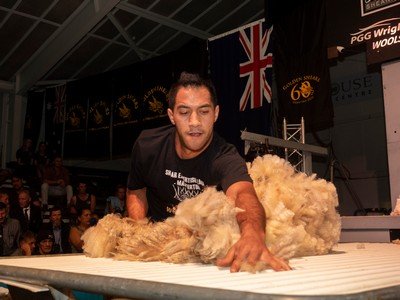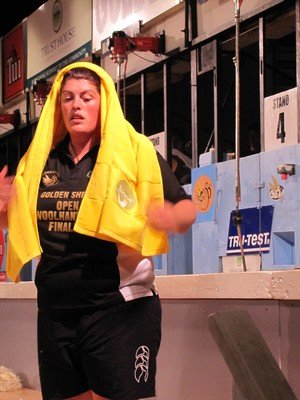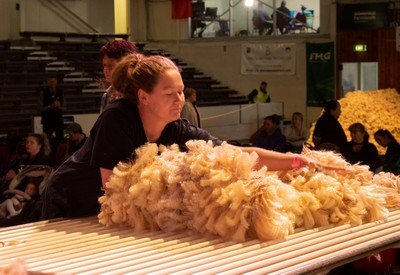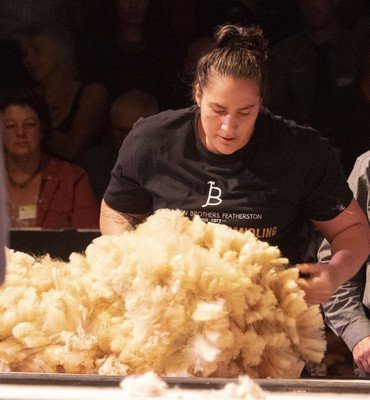Winning woolhandling: It's more about class, pride and passion
Perennial Golden Shears Open woolhandling champion Joel Henare is back in Masterton aiming for a 10th consecutive win in the event.
But it’s not so much about winning as working, in the pride and knowledge that woolhandling is a valued part of the New Zealand economy just waiting to be even more valuable – when the prices for the stock New Zealand strong wool start getting back to where they should be.
With about 100 woolhandlers lining-up for the Wairarapa Pre-Shears Woolhandling championships north of Masterton on Wednesday, followed by the three-day Golden Shears whch started today in Masterton War Memorial Stadium, Henare spoke of the passion woolhandlers have in the industry and the sport developed to help enhance the skills needed in the workplace.
“Contributing to the national economy by ensuring the fleece quality,” he said. “That’s what woolhandling competitions are designed to do.”
“That’s where we can find out, actually, who is doing it properly and ensuring that the farmer gets the best return for his wool that’s available,” he said.
“As anyone misses the oddments or anything that’s not fleece, that will discount the price, causing the farmer to lose-out on money,” he said. “But also it’s the integrity. When the wool presser, the wool classer or whoever writes on the bale that it’s fleece wool, then that’s what the wool buyer thinks that he is buying.”
“If there’s anything in there that’s not of fleece wool then he feels a bit cheated,” he said. “It’s the integrity of one’s word: What they deem to be good fleece wool and what they deem to be oddments or inferior wool type. That’s what will determine Saturday night’s winner, pretty much.”
Dannevirke woolhandler-turned-businesswoman Mavis Mullins, who was among those at the forefront of woolhandling competition around its introduction to the previously shearing-only Golden Shears in 1985, says that previously many thought woolhandlers were “just there to clear the wool out of the way for the shearers.”
But there had been a long history of certificated wool classing, and the advent of competitions and then World championships put into the spotlight the passion and pride that keeps the skills alive for “when the day comes – when the wool prices get back to where they should be.”
She is living testimony of the person development, winning the Golden Shears Open woolhandling title in 1987 and 1993 and being with late husband Koro a shearing contractor on the way to becoming a Massey University graduate with a Masters in business administration, the first and still-only female New Zealand World shearing and woolhandling championships team manager, the first female president of the Golden Shears International Shearing Championships Society, the first female board member and president of the Hawke’s Bay Rugby Union, and an inductee of the New Zealand Business Hall of Fame.
Now heading-up live-streaming commentary at the Golden Shears, with son Tuma heading-up the arena commentating and presentation – both in the footsteps of their late husband and father – Mavis Mullins says the passion of participation and the support for each other is much a part of the Golden Shears and other competitions throughout New Zealand.
Woolhandling is being contested this season at a record 27 of the 59 shearing sports competitions throughout the country.
From Gisborne but having grown-up in the woolsheds of Central Otago, 32-year-old Henare has amassed 137 wins since he first appeared in Open-class at the age of 14, including two individual World titles, and will start favourite to win the Golden Shears Open woolhandling title again, despite now limiting the appearances as he focuses more on his children from his base in Motueka.
This season he won four finals up to mid-January, but did not compete last weekend as the build-up started at Taumarunui and Apiti.
Leading the chase are former World teams title winners Keryn Herbert, of Te Kuiti, and Pagan Rimene, of Alexandra, and Logan Kamura, of Marton.
Herbert has also won four finals this year, including Taihape, Dannevirke and Apiti in the last month, but is yet to win the big one, having reached the final top four in Masterton seven times and been runner-up to Henare twice.
Rimene, whose mother won the title three times, has returned from a stint in Australia and won three major South Island events since mid-January, has been in the Golden Shears final three times, also with a best of twice placed second to Henare.
Kamura has made a late run with three wins in the last fortnight, at Ohura on February 17, Taumarunui last Friday, and at the Wairarapa Pre-Shears championships on Wednesday (re reults below).
At both the Pre-Shears Woolhandling Championships, the only wool-handling only on the Shearing Sports New Zealand calendar oif 59 shows throughout the country, and at the Golden Shears, there is also keen competition in the Senior, Junior and Novice grades, as the best from the south challenge the best from the north.
In Masterton there is also a transtasman woolhandling test match, the latest in a series which started in 1998. New Zealand is represented by Cushla Abraham, of Mastertonn, and Tia Potae, from Kennedy Bay, but based mainly over the years in Otago. Each is also an Open title hope, with one win each already in 2023-2024.
The Pre-Shears Championships at Massey University’s Riverside Farm, north of Masterton, included the North Island Woolhandling Circuit senior and Junior finals.




